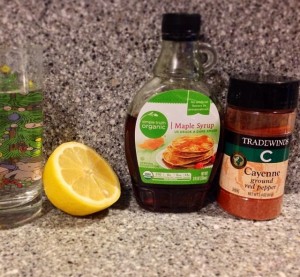 A few weeks ago on May 6 it was International No Diet Day (INDD). INDD was first commemorated in the early 1990’s by British feminist Mary Evans Young, an influential author and advocate whose successfully recovery from anorexia led her to establish the holiday. INDD is now an annual celebration of body acceptance and diversity that aims to raise awareness about discrimination with respect to body weight, the futility of dieting and promotion for a healthy and balanced lifestyle. Make No Diet Day everyday!
A few weeks ago on May 6 it was International No Diet Day (INDD). INDD was first commemorated in the early 1990’s by British feminist Mary Evans Young, an influential author and advocate whose successfully recovery from anorexia led her to establish the holiday. INDD is now an annual celebration of body acceptance and diversity that aims to raise awareness about discrimination with respect to body weight, the futility of dieting and promotion for a healthy and balanced lifestyle. Make No Diet Day everyday!
The Mark of a Fad Diet
For many of us the word “diet” carries a negative connotation and underlying associations with concepts like deprivation, severe restriction and failure.  A countless number of fad diets have been circulating in the mainstream for quite a few decades now. A sampling of the more popular diets over the years include: South Beach, Zone, Atkins, Nutrisystem, Cabbage Soup, Lemon Detox, Grapefruit, Paleo, Blood Type, the list goes on. Frankly, who can keep up?
A countless number of fad diets have been circulating in the mainstream for quite a few decades now. A sampling of the more popular diets over the years include: South Beach, Zone, Atkins, Nutrisystem, Cabbage Soup, Lemon Detox, Grapefruit, Paleo, Blood Type, the list goes on. Frankly, who can keep up?
Fad diets may emphasize low fat, low carbohydrate, high protein, or focus on one particular food or food group. The unfortunate reality is that the overwhelming majority of these diets omit entire food groups and proposed macronutrient proportions are not within the ranges deemed acceptable by major health organizations such as the Academy of Nutrition and Dietetics and the United States Department of Agriculture. These diets tend to lack major nutrients and promote weight loss claims based on slanted or little to no scientific evidence. Diets that reference research studies often disregard important details, such as small sample size and lack of peer review or external validity, which greatly undermines their credibility.
No matter how creative these multi-billion dollar industry diet plans are re-packaged and marketed, when we take a step back and question more critically we discover their common trait: a temporary solution that involves energy and nutrient restriction below the amount our bodies truly need. Once the diet is discontinued, any weight lost is usually regained fairly quickly. In fact, it has been reported that fad dieters regain as much as 80-100% of weight lost, a staggering statistic that begs the question about whether or not these diet plans are the best approach to successful weight management. The simplest explanation for this is that none of these diets teaches individuals how to change dietary patterns and behaviors to achieve a balanced and sustainable lifestyle. On the contrary, extreme diets can lead to distrusting natural cues for hunger and fullness and provoke anxiety around food, which consumes unnecessary amounts of time and energy and cultivates unhealthy relationships with food.
Here are a few characteristics that may help you identify a fad diet:
- Diets that guarantee rapid weight loss
- Dietary recommendations based on a single study or personal testimonials
- Diets that can only be followed or achieved by buying into a company’s products
- Diets that eliminate one or more of the five food groups
Healthy Lifestyle Promotion
 Registered Dietitians work with patients with certain disease states or who simply wish to adopt a healthier lifestyle to practice mindful, intuitive eating in order to achieve and maintain healthy body weight. If you or someone you know is looking for a practical and long-term solution to weight maintenance and disease prevention, examples of evidence-based, sustainable diets that are centered on a healthy lifestyle include the Mediterranean Diet and the DASH Diet. Both of these “diets” promote higher intakes of fruits and vegetables, whole grains, lean proteins, low-fat dairy products and heart healthy plant-based oils.
Registered Dietitians work with patients with certain disease states or who simply wish to adopt a healthier lifestyle to practice mindful, intuitive eating in order to achieve and maintain healthy body weight. If you or someone you know is looking for a practical and long-term solution to weight maintenance and disease prevention, examples of evidence-based, sustainable diets that are centered on a healthy lifestyle include the Mediterranean Diet and the DASH Diet. Both of these “diets” promote higher intakes of fruits and vegetables, whole grains, lean proteins, low-fat dairy products and heart healthy plant-based oils.
Cheers,
Dorothy Hanrahan, BS, BA
Eat Fit Health, Intern
MS Candidate Human Nutrition, 2014
Drexel University College of Nursing and Health Professions

